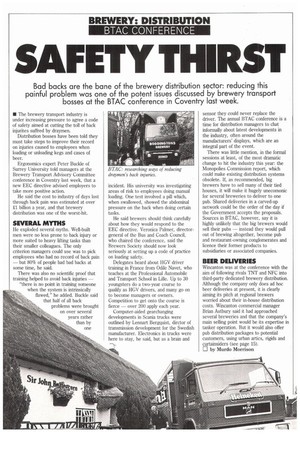SAFETY THIRST
Page 46

If you've noticed an error in this article please click here to report it so we can fix it.
Bad backs are the bane of the brewery distribution sector: reducing this painful problem was one of the potent issues discussed by brewery transport bosses at the BTAC conference in Coventry last week.
• The brewery transport industry is under increasing pressure to agree a code of safety aimed at cutting the toll of back injurites suffred by draymen.
Distribution bosses have been told they most take steps to improve their record on injuries caused to employees when loading or unloading kegs and cases of beer.
Ergonomics expert Peter Buckle of Surrey University told managers at the Brewery Transport Advisory Committee conference in Coventry last week, that a new EEC directive advised employers to take more positive action.
lie said the cost to industry of days lost through back pain was estimated at over £1 billion a year, and that brewery distribution was one of the worst-hit.
SEVERAL MYTHS
He exploded several myths. Well-built men were no less prone to back injury or more suited to heavy lifting tasks than their smaller colleagues. The only criterion managers could use was to pick employees who had no record of back pain — but 80% of people had bad backs at some time, he said.
There was also no scientific proof that training helped to avoid back injuries "there is no point in training someone when the system is intrinsically flawed," he added. Buckle said that half of all back problems were brought on over several years rather than by one incident. His university was investigating areas of risk to employees doing manual loading. One test involved a pill which, when swallowed, showed the abdominal pressure on the back when doing certain tasks.
He said brewers should think carefully about how they would respond to the EEC directive. Veronica Palmer, directorgeneral of the Bus and Coach Council, who chaired the conference, said the Brewers Society should now look seriously at setting up a code of practice on loading safety.
Delegates heard about HGV driver training in France from Odile Navet, who teaches at the Professional Automobile and Transport School in Lille, Up to 30 youngsters do a two-year course to qualify as HGV drivers, and many go on to become managers or owners. Competition to get onto the course is fierce — over 200 apply each year.
Computer-aided gearchanging developments in Scania trucks were outlined by Lennart Bergquist, dirctor of transmission development for the Swedish manufacturer. Electronics in trucks were here to stay, he said, but as a brain and
sensor they could never replace the driver. The annual BTAC conference is a time for distribution managers to chat informally about latest developments in the industry, often around the manufacturers' displays, which are an integral part of the event.
There was little mention, in the formal sessions at least, of the most dramatic change to hit the industry this year: the Monopolies Commission report, which could make existing distribution systems obsolete. If, as recommended, big brewers have to sell many of their tied houses, it will make it hugely unecomonic for several breweries to deliver to one pub. Shared deliveries in a carved-up network could be the order of the day if the Government accepts the proposals. Sources in BTAC, however, say it is highly unlikely that the big brewers would sell their pubs instead they would pull out of brewing altogether, become pub and restaurant-owning conglomerates and licence their former products to subsidiaries or associated companies.
BEER DELIVERIES
Wincanton was at the conference with the aim of following rivals TNT and NFC into third-party dedicated brewery distribution. Although the company only does ad hoc beer deliveries at present, it is clearly aiming its pitch at regional brewers worried about their in-house distribution costs. Wincanton commercial manager Brian Astbury said it had approached several breweries and that the company's main selling point would be its expertise in tanker operation. But it would also offer pub distribution packages to potential customers, using urban artics, rigids and curtainsiders (see page 15).
0 by Murdo Morrison




















































































































































